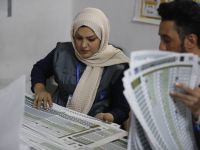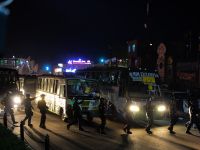Fears of an economic slowdown in South Korea escalated Sunday after September industrial output growth, hit by high oil prices, experienced its lowest rise in 17 months.
September's industrial output grew 15.1 percent year-on-year, compared to 19.3 percent in July and 24.6 percent in August.
The National Statistical Office (NSO) blamed slower semiconductor exports, weakening domestic demand for cars, shorter working days and strong growth last year.
"We have yet to see whether an economic downturn is coming or not," Park Hwa-Soo, a senior NSO official, told reporters.
However, he warned high oil prices and uncertainty over corporate restructuring could further hurt production.
In September, inventory rose 14.6 percent year-on-year, compared to a 14.1 percent gain in August.
Factories operated at 78.1 percent of full capacity, down from 82 percent in August and the average 79.5 percent in the first half of this year.
Semiconductor production grew 38.1 percent year-on-year in September against a 69.1 percent rise in August. Auto production growth slowed to 10.6 percent from 15.4 percent a month ago.
Combined wholesale and retail sales gained 6.1 percent year-on-year, compared with a 8.2-percent rise in August. The fall reflected sluggish demand for automobiles and mobile phones.
Investment in plants and equipment posted a 18.9 percent growth year-on-year, down sharply from 38.1 percent in August. Gross shipments grew 15.2 percent year-on-year, down from 24.8 percent in August.
Other indicators also showed signs of a slowdown, as financial markets remained volatile due to the delayed restructuring of debt-stricken banks and corporations.
South Korea posted a 1.82 billion dollar current account surplus in September. But the accumulated surplus in the first nine months to September shrank to 7.73 billion dollars from 18.8 billion dollars a year earlier.
The capital account turned to a deficit of 901 million dollars in September from a 193 million dollar surplus in August, resulting in a 13.08 billion dollar surplus for the first nine months.
"An outflow of foreign stock funds and local financial institutions' repayments of their foreign debt resulted in a capital account deficit," the central Bank of Korea said in a statement.
The government has announced a series of steps worth billions of dollars to bolster the sagging stock market, which has lost about half of its value since the beginning of this year.
Analysts, however, said the market would remain weak due to uncertainties over Hyundai and Daewoo groups.
"Uncertainty is mounting over the economic reforms at home," Dongwon Securities analyst Shin Jin-Ho said.
South Korea made a dramatic rebound from a crisis that forced the country to take a 58-billion-dollar bailout from the International Monetary Fund (IMF) in late 1997.
But the banking sector still has huge bad loans, which will require additional state funds on top of the 109 trillion won (96 billion dollars) already pumped into its restructuring -- SEOUL (AFP)
© 2000 Al Bawaba (www.albawaba.com)







